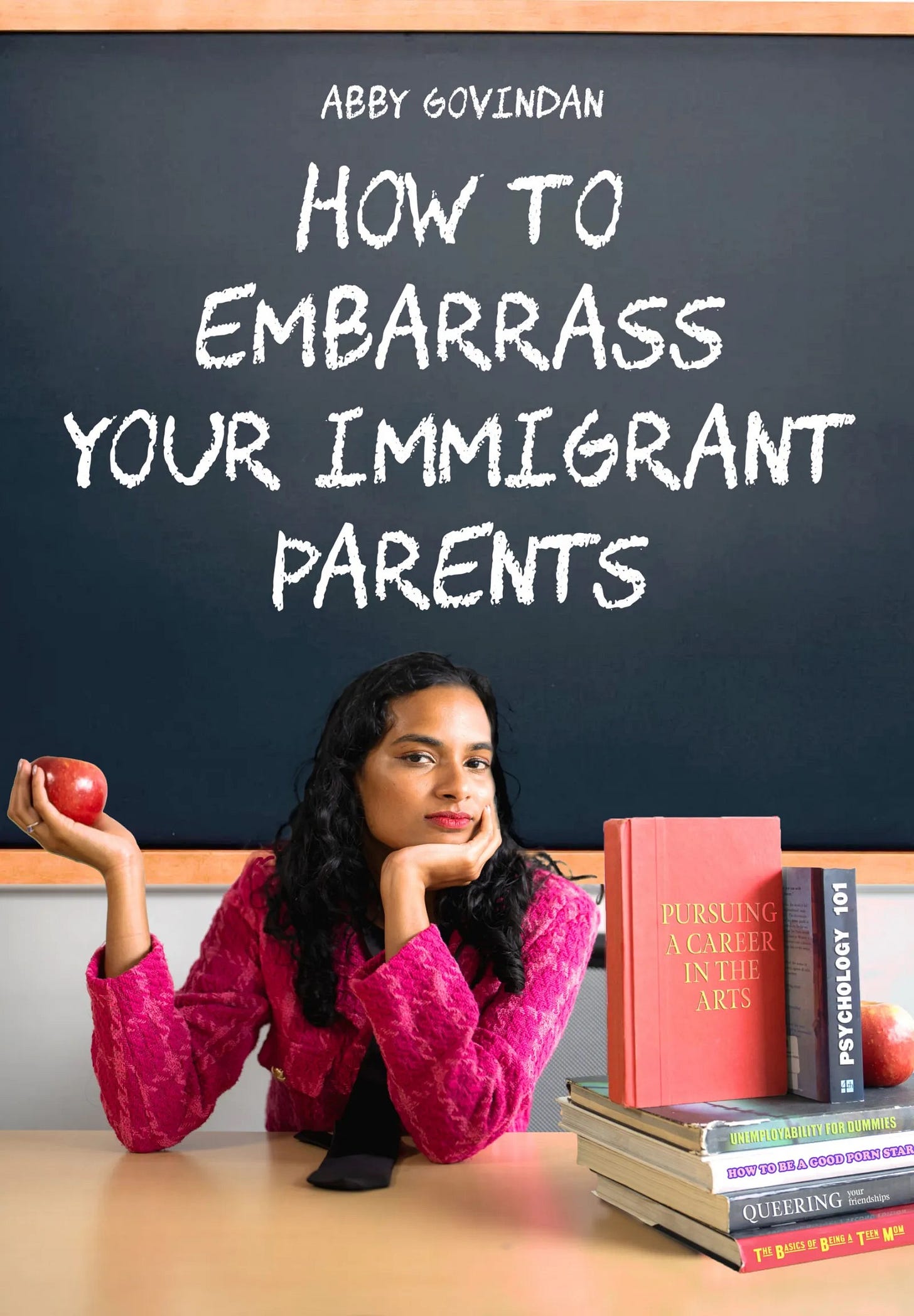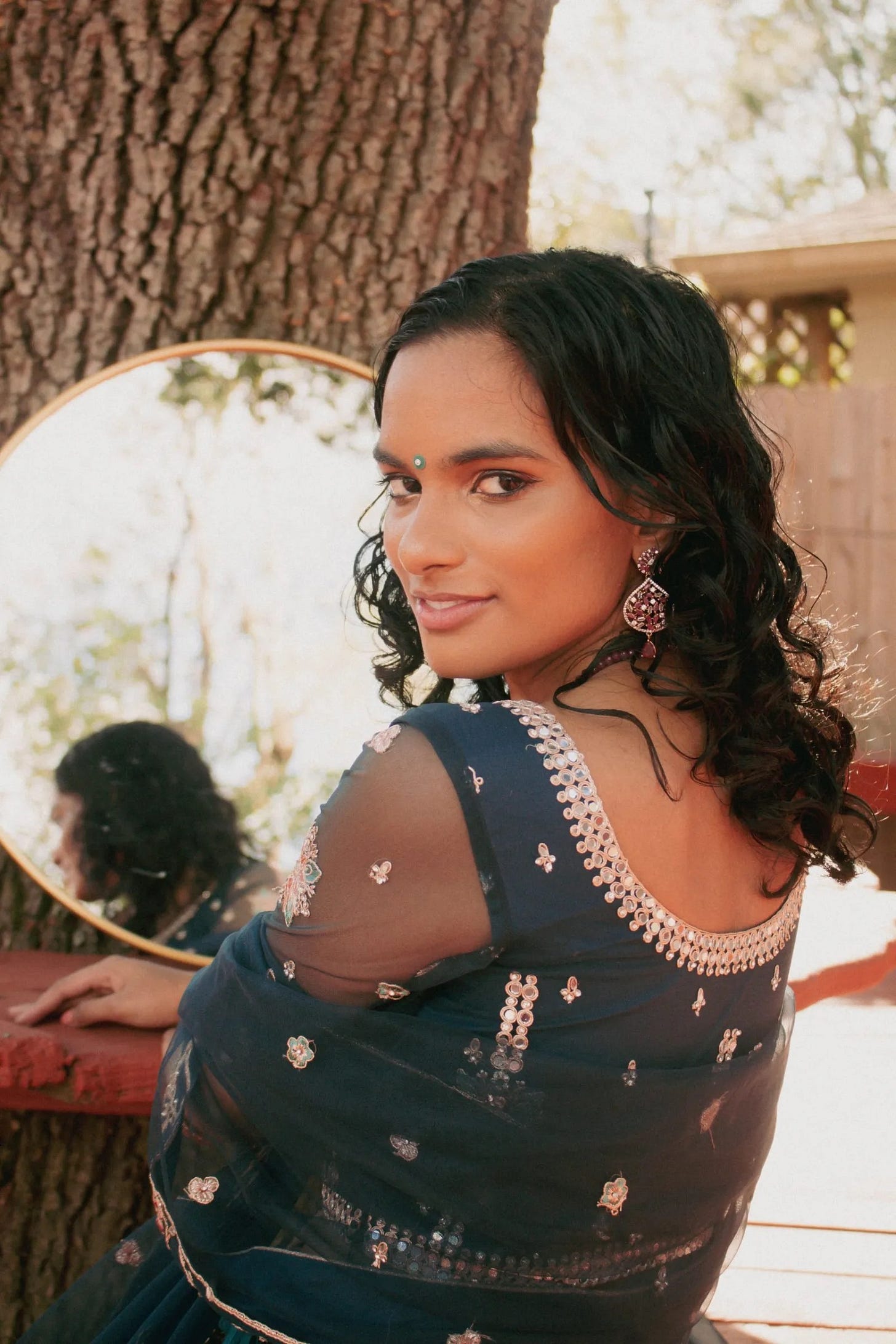Abby Govindan on how to embarass your immigrant parents, mental health, and Tamil comedy
Welcome to Export Quality, your home for news by and about South Asian Americans and Canadians - and everything in between
In my quest to not let U.S. politics take over everything I write and do professionally and to celebrate all of us diaspora kids in careers our parents might have been wary of at first, I had the pleasure of talking to comedian Abby Govindan the other day about her upcoming off-Broadway show How to Embarrass Your Immigrant Parents, running at the Soho Playhouse from March 19-22!
We talked about parents, the film stylings of Rajinikanth, mental health struggles, and Russell Peters. I’ve never felt more elder millennial compared to Govindan’s fresh-faced 27, but also Tamil girls FTW!
Export Quality (EQ): You’re in an off-Broadway show! That’s amazing. It’s obviously about your relationship with your parents. [Abby’s mom, Kalyani (auntie), walked into the Zoom frame too <3].
Abby Govindan (AG): The show is the story of how I told my parents I wanted to be a stand-up comedian, how our relationship fell apart because of it, and how we built it back up after my brief stint in a mental hospital following a suicide attempt. After the suicide attempt, my parents really rallied around me in a way that meant a lot to me and that I never thought possible.
EQ: I love that. Did you notice they repeat patterns or react to their own upbringing? I don’t blame them! We’re all products of our upbringing in some way.
AG: One really sobering moment in the show is when I talk about a gigantic fight with my mom. Afterward, we got ice cream in silence for an hour, and then my mom talked about how she and my Dad were concerned why I wasn’t “taking the easy route” in a STEM field, which they were told would guarantee their immigrant child’s future.
There's another part where I talk about how growing up, my dad used to yell at me at the dinner table until I cried about doing poorly on math tests. I assumed that's just how he was raised too. But then I asked him about it and he said, "No, your grandfather threw me into the lake, and I didn't know how to swim." In a way, my dad was unlearning trauma if all he did was yell at me and not resort to any lake-based punishment.
EQ: You talk in the show about social media’s influence on you and your career. Has your relationship also evolved over time?
AG: I've grown so much as a person since the first time I went viral in 2018. Those tweets that went viral are memorials for the worst period of my life, even if that's not what they look like to the outside world. Sometimes when I see them, I'm transported back to a version of me that doesn't exist anymore. The internet incentivizes oversharing, and I got addicted to oversharing. After I was hospitalized for a suicide attempt, I took a gigantic step back from oversharing on Twitter. What I learned in therapy was understanding that those versions of you are the only reason that you have the present version of you.
EQ: Russell Peters was a big influence for my generation. He was the first South Asian person - in American comedy, television, entertainment - most of us ever saw. Was he an influence on you as well?
AG: Russell Peters is literally my origin story. When I was around seven or eight, we were at temple camp at Ashram Vidya Gurukul in Pennsylvania hanging out with my older, teenage cousins. [Editor note: shout out to Amar Chitra Katha ink on your fingers and the Sundays during football season our Dad didn’t drive us to class at the temple because it meant missing the Browns game].
We snuck into the activity center once to watch some YouTube video. I thought Russell Peters was just some white stand-up comedian. Then they pulled up a pirated version of one of his routines and this Indian man walked on stage. It was a revelation to me as a nine-year-old. That was the first time I learned about Indian stand-up comedians. It was also the first time I learned about Malayali Christians.
EQ: Russell was America's introduction to having Indian parents and it kind of became a thing for a lot of immigrant comedians to use an accent when talking about their parents. Why did you choose not to?
AG: I want to reinvent the wheel somehow when I go on stage. But I'm so grateful for the amazing comedians who came before me who found immense success as unapologetically Indian comedians. Their existence truly paved the way for someone like me to find success now. I don't think I have the pluckiness to be a trailblazer. It takes a lot of bravery, investment in yourself, and self-assuredness. But I can look at the trail that has been blazed before me and walk that confidently because of comedians like Russell Peters, Hasan Minhaj, Aparna Nancherla, Mindy Kaling, Lilly Singh, and Liza Koshy – people who took these really big creative swings which weren't common for Indian people at the time.
EQ: I feel like Tamil culture also plays into this in some way, not just in terms of immigrant expectations but the rhythm of our language. Paatis and thathas’ comedy, *chef’s kiss*
AG: I'm so glad that you speak Tamil so you can understand when I say it's a very comedic language. Long before I knew what standup was, my grandfather and I would watch Tamil comedies after school. I talk about American and British influences, but I can’t deny the impact that my Dad being a huge Rajinikanth fan had on me. Even their process of writing their own, iconic monologues in their films, is fascinating.
EQ: As a journalist, I have gotten my fair share of online hate, but I have a separation with my work because I'm not reporting about myself. Since a lot of your comedy is about your life, are you able to have a healthy separation, or is that not part of the calculus?
AG: I create a separation. I really regret not coming up with a stage name. I wish I had come up with a separate name that belongs to the public and it feels like that's a part of me that I can never take back. What I started doing is asking people in my personal life to call me [by a different version of my name].
That makes me feel like they know me as a person, as opposed to people who understand me differently based on what they see on stage. It's also really grounding to have a bunch of friends who have nothing to do with the entertainment industry and a good reminder that tomorrow, if I chose to walk away from stand up comedy, I would be fine.
EQ: What about New York do you love and hate right now?
AG: I hate Eric Adams. I hate everything about him.
EQ: Correct.
AG: I invited mayoral candidate Zohran Mamdani to come [to my off-Broadway show], so he's going to be there after every show, talking to people, getting signatures outside the theater. Looking at Zohran, he’s driven by empathy and a desire to see working-class people succeed in a city that belongs to working-class people. I'm reminded that optimism is a much better option than pessimism.
EQ: What shows are you binging right now?
AG: I’m going to watch "Deli Boys." I'm a big Asif Ali fan – another trailblazing South Asian comedian - and, of course, Poorna Jagannathan.
EQ: Another Tamil girl FTW! Where are you eating in NYC these days?
AG: My favorite restaurant in East Harlem was a place called Bangklyn – a combination of Bangkok and Brooklyn. It's run by one guy who's the only employee. He just seems very annoyed when you walk in, but you know the food is going to be good. My mom's been in town this week, so I've been eating a lot of home-cooked Indian meals. I didn't have many groceries in the fridge since I just moved but every day, I wake up at 10 AM and she's already cooked an extensive lunch from the seven groceries in my fridge. It's like magic!
You can buy tickets to her show and/or support the cost of putting on the show if you can’t make it in person!
For more resources on South Asian mental health, I sugguest following my longtime friend Dr. Shanta Kanukollu; and Dr. Sahaj Kohli at Brown Girl Therapy.





Hey,
Funny piece! I also wrote a text on the experience of immigration that you may enjoy.
https://substack.com/@maninplaid/note/c-103001424?r=pmefy&utm_medium=ios&utm_source=notes-share-action